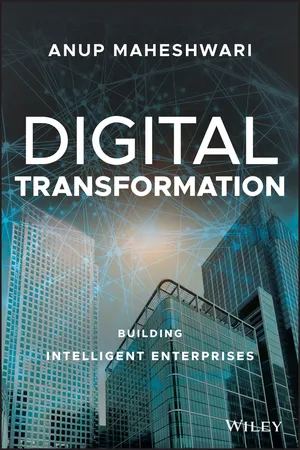
- English
- ePUB (mobile friendly)
- Available on iOS & Android
About this book
Building Intelligent Enterprises by leveraging the emerging and next-generation technologies to accelerate the adoption of digital transformation
The speed of innovation and emerging IT technologies are changing at a very fast pace and enterprises are eager to join the digital revolution so they can stand above the competition and succeed as the enterprise of tomorrow. This book is an attempt to make the enterprise intelligent by providing the path to digital transformation and the adoption of new IT methods, tools and technologies.
This book has been organized to cover the following topics: Digital Transformation, Design Thinking, Agile, DevOps, Robotic Process Automation, Internet of Things, Artificial Intelligence, Machine Learning, Blockchain, Drones, Augmented and Virtual Reality, 3D Printing, Big Data, Analytics, Cloud Computing, APIs, and SAP Leonardo. No prior knowledge of any technical coding or language is necessary to understand the content of this book.
- End-to-end storyline to accelerate the enterprise's digital transformation journey
- How an enterprise can stay relevant, compete, and perform in the digital economy
- How to leverage these technologies to build intelligent enterprises
- Understand and apply the emerging technologies across key business processes
- Industry-specific Use Cases for all technologies as a reference point to build the business case for implementation
The book is very well suited towards the C-Suite executives, both IT and business leaders, directors and managers, project managers, solution architects, and all professionals who have an interest and desire to keep up-to-date with the latest technological trends, looking for a career change, want to help enterprise adapt and onboard the digital roadmap, or have an agenda to digitize key processes within the enterprise to make it intelligent.
Frequently asked questions
- Essential is ideal for learners and professionals who enjoy exploring a wide range of subjects. Access the Essential Library with 800,000+ trusted titles and best-sellers across business, personal growth, and the humanities. Includes unlimited reading time and Standard Read Aloud voice.
- Complete: Perfect for advanced learners and researchers needing full, unrestricted access. Unlock 1.4M+ books across hundreds of subjects, including academic and specialized titles. The Complete Plan also includes advanced features like Premium Read Aloud and Research Assistant.
Please note we cannot support devices running on iOS 13 and Android 7 or earlier. Learn more about using the app.
Information
PART I
Introduction
CHAPTER 1
Digital Transformation
Digital Transformation
- How shall I adapt to new digital trends?
- How shall I identify new opportunities and business scenarios?
- How shall I get started?
- How shall I attract new talent from the market?
- How shall I incorporate change management?
- How shall I convince the stakeholders to approve the idea?
- How shall I internally fund and govern digital transformation projects?
- How shall I help the employees and business partners get connected through digital means?
What Causes Business Disruption
Factors That Influence Digital Transformation
Table of contents
- COVER
- TABLE OF CONTENTS
- PREFACE
- ABOUT THIS BOOK
- ACKNOWLEDGMENTS
- PART I: Introduction
- PART II: Collaborative Methods and Tools
- PART III: Intelligent Technologies
- PART IV: Digital Infrastructure
- PART V: Product Review
- ABOUT THE AUTHOR
- INDEX
- END USER LICENSE AGREEMENT